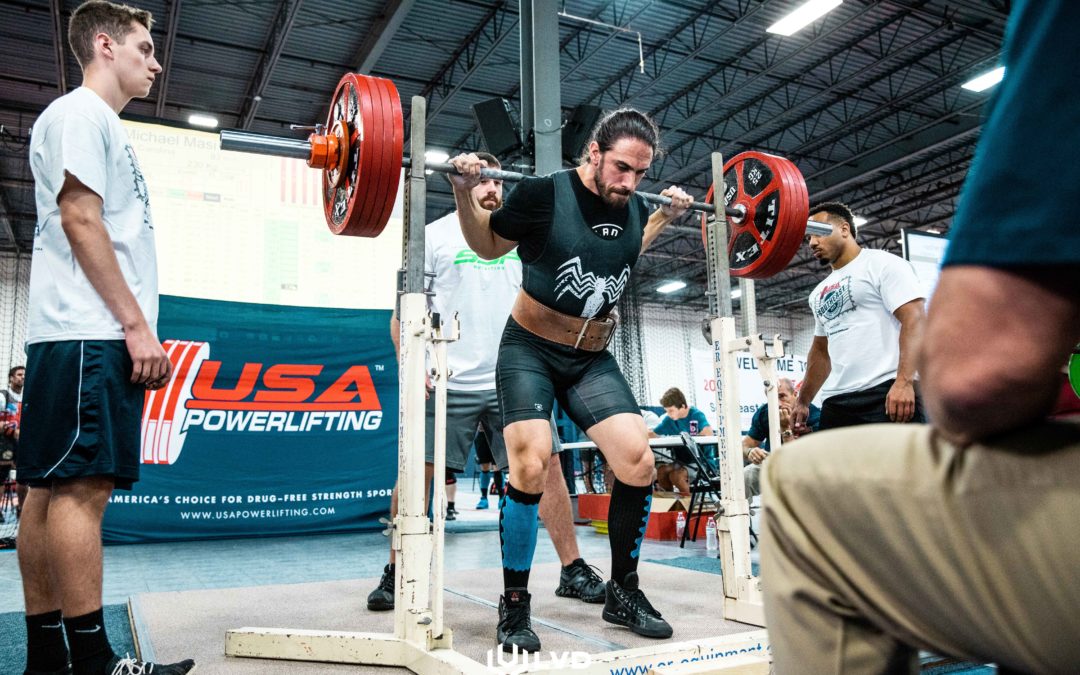Part 1 – What is Powerlifting?
Powerlifting is a strength-sport in which competitors attempt to lift as much weight as they are capable over three different exercises; the back squat, the bench press, and the deadlift. Most programming also involves big comprehensive movements to compliment these three lifts, including; the overhead press, bent over row, pull-up, and weighted carry.
This, at face value, may sound dangerous, daunting, and possibly scary. I mean, one of the exercises has the word dead in it! And, you know, people on the internet say that lifting weights can’t be good for your back, and you should never lift weights overhead. Also, your friend knows a jacked guy that has injuries so, how can this possibly be therapeutic?
Well, it’s true that if you perform these exercises incorrectly, you may be risking injury. But if you break it down, you are performing these movements multiple times throughout the day anyway! Reaching into cabinets overhead, picking items up off the ground, moving your couch, getting in/out of your car and on/off the toilet, carrying in groceries, etc., all of these movements require some derivative of the aforementioned exercises. If you think of this from the perspective that you already perform these movements, you might as well learn how to do them well in an effort to mitigate risk for injury.
So how does this translate to rehabilitation from injury?
As a physical therapist I treat an array of orthopedic issues every day. The purpose of this blog series is to go through the top ten orthopedic injuries that I treat, and show how conventional powerlifting training may be the best intervention for these issues from a rehabilitative perspective. The top eight issues I see, in no particular order, are:
- General Low Back Pain
- Knee pain: Osteoarhtritis / Patella femoral pain syndrome / Patellar tendonitis
- Hip Pain: Sciatica / Piriformis Syndrome
- Shoulder pain: Impingement / Non-traumatic Rotator Cuff tear
- Plantar Fasciitis
- Epicondylalgia: Golfers Elbow / Tennis Elbow
- Carpal Tunnel Syndrome
- Poor Balance (not visual / vestibular / somatosensory related)
This blog series will be set up to address each of these orthopedic issues individually within each blog post, highlighting the benefits of skilled powerlifting training with regards to rehabilitation from injury along the way.
How do I get started?
Sold already, but don’t know where to start? No worries! I have posted directories below that will point you in the right direction so you can find skilled practitioners in your area.
Masi Fitness – If you’re local to the Charlotte Area, stop on in! I have been helping strength-sport athletes overcome various injuries and return to training and competition for over 5 years. This is including Powerlifting, Bodybuilding, Strongman, Olympic Weightlifting, Crossfit, as well as recreational and youth athletes. Feel free to peruse this blog, or download any of our e-books for some more FREE, quality, information on how to improve your lifts and ways to work around common aches and pains.
APTA Specialist Directory – This is the directory for the American Board of Physical Therapy Specialties (ABPTS). There are options to search within each specialty. An orthopedic specialist would be able to help best with nagging aches and pains and help get you back to sport specific training. A sport specialist may help you overcome, manage, or avoid injury within your sport. Some Sport Specialists have a sub-specialty with a specific sport, or set of sports.
The Clinical Athlete – This is a directory of healthcare providers that happen to be athletes themselves. Again, you can search by location and filter for specific providers. Peruse each providers website to see who is the best fit for you.
RSCC Registry – This is a directory of Strength and Conditioning Specialists that are registered with the National Strength and Conditioning Association (NSCA). This directory allows you to filter by location and search based on years of experience. Peruse this directory to find a Strength and Conditioning Specialist in your area.
Author: Dr. Michael Masi
Masi Fitness, LLC
IG: @Masi_Fitness

